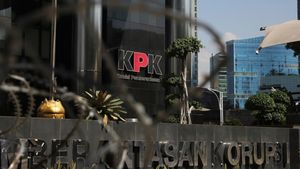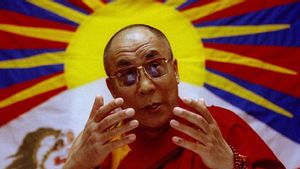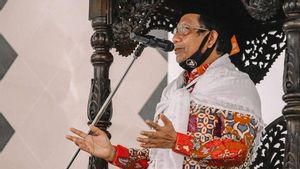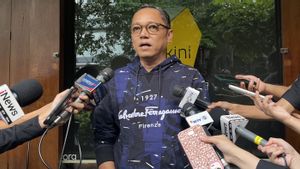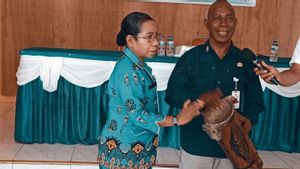JAKARTA - Social media activist, Eko Kuntadhi sparked controversy on Twitter's timeline. He alluded to the film Nussa as an image of the identity of the Taliban because the main character is dressed in a robe and a headscarf. This kind of narrative is similar to the discriminatory stereotypes of Muslims in the West.
"Is this a photo of an Indonesian child? No. Men's clothing is very typical of the Taliban. Afghan children," said Eko via his Twitter account @eko_kuntadhi.
"But the film Nusa Rara wants to be promoted throughout the world. To make the world think, Indonesia is a branch of the caliphate. Or part of the power of the Taliban. A destructive promotion!"
The post received a lot of responses from netizens. The word "Taliban" even became a trending topic on Twitter on Sunday, June 20.
Is this a photo of an Indonesian child? Nope. The boy's clothing is very typical of the Taliban. Afghan child.
But the film Nusa Rara wants to be promoted to the whole world. So that the world thinks that Indonesia is a branch of the caliphate. Or part of the Taliban rule.
Destructive promotion! pic.twitter.com/iLKMVVCGEi
— Eko Kuntadhi (@eko_kuntadhi) June 19, 2021
The reactions from netizens were mixed. The owner of the @hanifahalhaq account, for example. She quipped about the non-objective freedom of dress.
"For those who are scantily clad, they say don't judge the book by its cover. Freedom of dress, freedom of expression. If you are covered you call it the Taliban. Let's learn to be more objective," she tweeted.
A satirical commentary on Eko Kuntadhi's tweet also came from the comedian, Ernest Prakasa. "Haven't got the commissioner's quota yet, sir? Hopefully soon, amen!" he wrote via the @ernestprakasa account.
Besides being known as a social media activist, Eko Kuntadhi, as described by Tribunnews, is also often dubbed a buzzer or a government buzzer. His name began to circulate when he often made controversial tweets.
Still nuanced satire, Ryan Andriandy, the animator of the film Nussa also commented on Eko Kuntadhi's tweet. Ryan uploaded a photo showing the character Nussa dressed as an astronaut.
"Taliban Talibun, just read the synopsis of our film on the BIFAN website. Anyway, I'll give you a picture of NUSSA wearing its astronaut outfit. Let you all know that NASA has a branch in Ciledug," he tweeted on his personal Twitter account, @Adriandhy on June 20.
Taliban Talibun, just read the synopsis of our film on the BIFAN website. Anyway, I'll give you a picture of NUSSA wearing its astronaut outfit. Let you all know that NASA has a branch in Ciledug. Led by NASSA-R KDI. He sings dangdut actually just propaganda so that we all move to Saturn. https://t.co/j9KDIy8Mlr pic.twitter.com/yXlfXlPZtU
— JUMBO - My Debut In Visinema Animation. SOON! (@Adriandhy) June 20, 2021
The reaction to Eko Kuntadhi's tweet was not only in the form of a joke. Nahdlatul Ulama (NU) figure Nadirsyah Hosen, for example. He said that the way a person dresses does not automatically indicate his ideology. Those who wear the veil, Muslim long dress, Muslim pants, or clothes that are identical to other Muslims do not automatically embrace extreme ideologies like the Taliban.
"Radicals are not about clothes. Those who wear a veil, Muslim long dress, Muslim pants or syar'i hijab do not automatically make them become radicals, taliban, kadrun, or whatever the label is. It's troublesome if it's about this, they don't understand and continue to play with the issue, divide the nation," said Nadirsyah quoted from his Twitter account, @na_dirs.
The narrative linking Islamic dress with extremists like the Taliban is not new. This kind of phenomenon has occurred in Muslim minority countries.
Muslim identity discrimination
Sahar Aziz in his writings published by Oxford Islamic Studies explains how prejudice against people who dress Islamically thrives in the United States (US). He said, discrimination against Muslim identity began to spring up after the tragedy of the Al-Qaeda extremist group attack that hijacked a plane and crashed it into the WTC Twin Towers and the Pentagon, USA on September 11 or the 9/11 attacks.
The tragedy has an anxious and angry public calling for systematic profiling and strict surveillance of Muslims. The most visible targets are Muslim women in headscarves.
Suddenly, the seeds of hatred and suspicion grew for the veiled person. They are often the target of racial violence in public places and discrimination in the workplace.
It also makes minority Muslims worry about the safety of children who are in school. They worry that teachers and other students harbor anti-Muslim sentiments that arise from stereotypes in the media.
They also questioned whether they should give up their religious rights by taking off their headscarves in order to keep themselves and their families safe. Another reason is to keep the job needed to support them financially.
"Since 9/11 they have faced stereotypes as terrorists or terrorist sympathizers who are disloyal and anti-American," Aziz wrote.

Impact of discrimination
The emergence of the "Islamic terrorist" stereotype has serious implications for the minority Islamic community in the US. They often get discriminated against in the US.
"Stereotypes about women in headscarves sparked violent reactions from foreigners shouting racial epithets and religious sentiments such as terrorist, a 'bastard Muslim', as demands came for them to 'go home' and get out of the US," Aziz said.
Many Muslim women have had their headscarves ripped off by their attackers. In late 2010, the frequency of violence perpetrated against Muslim women based on racial and religious hatred increased at an alarming rate. In the span of two months, at least six reported hate crimes cases across the country were committed against Muslim women who wore headscarves.
In addition, Muslim discrimination in the workplace has also increased dramatically after 9/11. Many bosses refuse to hire female Muslim employees who wear the hijab or change their policies to force their female Muslim employees to remove their headscarves.
Other countries
Apart from the US, in several other western countries such as France and Canada, discriminatory actions against Muslim identity have also occurred. In the City of Mode, according to Afadlal in the journal of the Indonesian Institute of Sciences (LIPI) in 2016, the wearing of headscarves by Muslim women in government buildings is an act of insinuation against Western civilization.
Likewise in Canada. "Officials tend to accuse headscarves of fighting freedom. They seem to still doubt whether this is really against the law. Moreover, there is a possibility that wearing the headscarf is part of a belief, not just a religious identity," Afadlal wrote.
Another bad fact, according to Afadlal, is the suspicion of Islam. For example, political Islam is considered to thwart democracy and become a source of violence. The French government is currently imprisoning many hard-line Muslims.
Suspicion of Islam, according to Afadlal, also motivates the government to discriminate, for example in the processing of personal documents and identity. "There are even cases of passports of non-White citizens being dumped just to show discrimination," Afadlal wrote.
*Read other information about POPULAR CULTURE or read other interesting articles from Ramdan Febrian.
Other SOLID News
SEE ALSO:
The English, Chinese, Japanese, Arabic, and French versions are automatically generated by the AI. So there may still be inaccuracies in translating, please always see Indonesian as our main language. (system supported by DigitalSiber.id)




